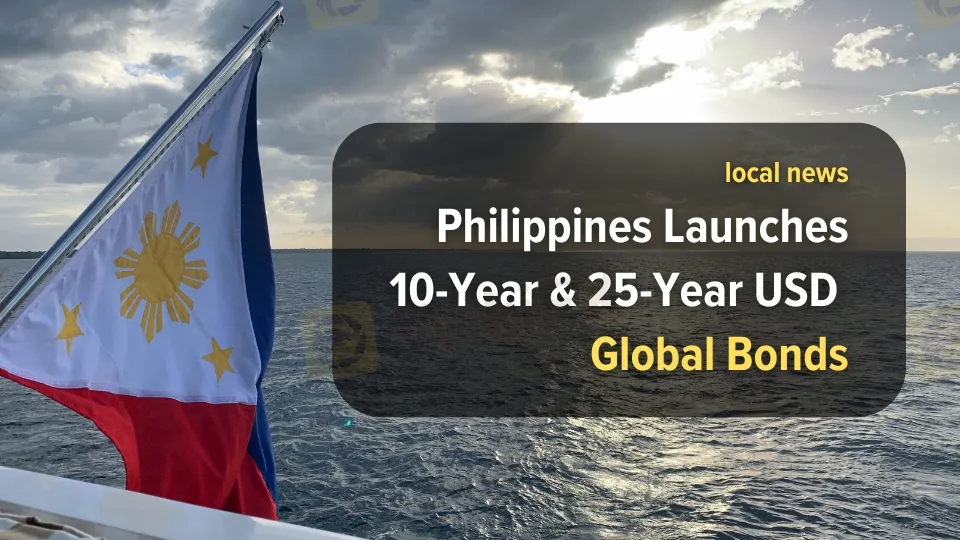Philippines Launches 10-Year & 25-Year USD Global Bonds
Abstract:Philippines launches 10-year & 25-year USD global bonds and euro sustainability bonds under its Sustainable Finance Framework, attracting global investors.

The Philippines has officially made its first venture into the international debt market this year, offering dual-tranche US-dollar global bonds and a euro sustainability bond. This issuance highlights the country's continued commitment to sustainable financing and fiscal stability.
Treasury Unveils Key Bond Details
On Thursday, the Bureau of the Treasury (BTr) announced its dual-tranche 10-year and 25-year fixed-rate US-dollar global bonds, along with a seven-year euro sustainability bond. The Treasury emphasized the significance of this move, marking the countrys first-ever euro sustainability bond and its return to the euro bond market in 2021.
“The USD 25-year Global Bond and EUR 7-year will be issued under the Republics Sustainable Finance Framework,” the Treasury said. National Treasurer Sharon P. Almanza noted that the government is targeting benchmark-sized bonds, typically valued at $500 million or more.
The 10-year dollar bonds will support general budget financing, while proceeds from the 25-year dollar bonds and euro sustainability bonds will refinance existing assets in line with the Sustainable Finance Framework.
Strong Market Demand for Bonds
The Philippines capitalized on a favorable market environment, setting the initial price guidance (IPG) for the 10-year and 25-year dollar tranches at Treasuries +120 basis points (bps) and 6.100%, respectively. The euro bond tranche was announced at mid-swap +160 bps. The pricing was scheduled to occur during Thursday's New York trading session.
“With a constructive market developing over the week, we see an opportune window for the Republic to re-enter the capital markets,” Ms. Almanza stated. She highlighted the importance of leveraging market momentum to secure competitive borrowing costs amidst potential uncertainties.

Prominent global financial institutions such as Citigroup, Goldman Sachs, HSBC, JPMorgan, Morgan Stanley, Standard Chartered, and UBS served as joint lead managers and bookrunners. Additionally, HSBC, Standard Chartered, and UBS acted as sustainability structuring banks.
Positive Outlook from Investors
Investor demand for the bond offering is expected to be robust, with projections suggesting up to $2 billion in bids. Traders believe the proceeds will largely address refinancing needs, including $1.5 billion in maturing dollar bonds due in March and €650 million in euro-denominated debt due in April.
Rizal Commercial Banking Corp. Chief Economist Michael L. Ricafort highlighted that the elevated US Treasury yields make the bond sale particularly appealing to investors. “We expect strong demand from foreign investors who are looking to take advantage of yield pickup,” he stated. He further noted that higher demand could result in lower borrowing costs for the Philippine government.
Senior Adviser Jonathan L. Ravelas from Reyes Tacandong & Co. estimated that the government could raise between $3.5 billion and $5 billion from the bond sale. “The timing could be right as the US 10-year yields are taking a breather,” he added.
Credit Ratings and Fiscal Confidence
Fitch Ratings affirmed a “BBB” rating for the Philippines‘ proposed US-dollar and euro bonds, consistent with its sovereign credit standing. Similarly, S&P Global Ratings assigned the bonds a “BBB+” rating, matching the country’s sovereign credit score.
Finance Secretary Ralph G. Recto confirmed the government‘s intent to raise $3.5 billion from the international debt market this year, most of which will be in US dollars. This move is aligned with the country’s ongoing efforts to secure budgetary funding and maintain fiscal sustainability.
Final Thoughts
The Philippines‘ dual-tranche US-dollar global bonds and euro sustainability bond issuance demonstrate the government’s strategic approach to securing funds for budget financing and refinancing needs. With favorable credit ratings and strong demand from investors, this move underscores the country's ability to navigate the global capital markets effectively while prioritizing sustainable financing.

Read more

Anti-Scam Groups Urge Tougher Action on Fraudsters in UK
Anti-scam groups demand tougher police action on fraudsters as UK fraud rates surge 19%, targeting millions in a penalty-free crime spree exposed by a $35m scam leak.

Philippines Deports 29 Indonesians Linked to Online Scam Syndicate in Manila
Online scam groups in the Philippines trick Filipinos into gambling and love scams, from Manila to Bacolod, causing trafficking and pain as police fight back.

How Reliable Are AI Forex Trading Signals From Regulated Brokers?
Discover how reliable AI Forex trading signals are and why using a regulated broker boosts their effectiveness. Learn key factors to evaluate accuracy and enhance your trading.

Top Currency Pairs to Watch for Profit This Week - March 31, 2025
Discover the top 5 currency pairs to trade for profit this week, March 31, 2025—USD/JPY, EUR/USD, GBP/USD, AUD/USD, USD/CHF—with simple strategies and best times.
WikiFX Broker
Latest News
How Crypto Trading Transforms FX and CFD Brokerage Industry
UK would not hesitate to retaliate against US tariffs - No 10 sources
FCA Warns Against 10 Unlicensed or Clone Firms
CySEC Warns Against 14 Unlicensed Investment Websites
Top Currency Pairs to Watch for Profit This Week - March 31, 2025
Will natural disasters have an impact on the forex market?
Philippines Deports 29 Indonesians Linked to Online Scam Syndicate in Manila
Navigating the Intersection of Forex Markets, AI Technology, and Fintech
Exposed: Deceptive World of Fake Trading Gurus – Don’t Get Fooled!
AI-Powered Strategies to Improve Profits in Forex Trading
Rate Calc

